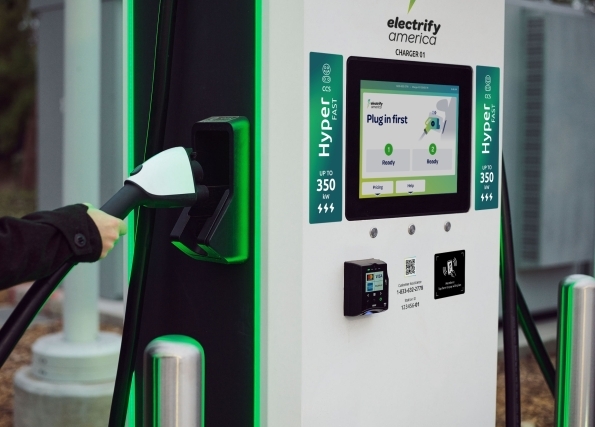By Jared Jacob
Boston University News Service
Alec Mitkov, a 23-year-old engineer working at SpaceX had a peculiar requirement during his job hunt: company-provided car charging for his beloved Tesla Model 3.
“The reason why I got the car in the first place, which was really the tipping point from getting a sports car… was the fact that I could charge at work. I’ve always asked when applying to jobs, ‘Do you have free electric charging?’” Mitkov said.
Obvious environmental benefits aside, high-end Teslas and other electric vehicles (EVs) are becoming more common on the streets of Boston for their improving range and capabilities.
The Tesla Mitkov purchased rivals some of the top performance gas-powered cars on the market, accelerating from 0 mph to 60 mph in just 3.1 seconds, according to Car and Driver.
At his SpaceX worksite, Mitkov says that nearly 70 of his coworkers take advantage of free company-provided chargers to keep their cars topped up while they’re sitting down plugging away.
And while electric vehicles may still be relatively niche, Boston is preparing for them to make up a majority of cars on the road in the next few decades.
“Consumer EV adoption in Boston is projected to reach a range of 54% (Low Scenario) to 71% (High Scenario) of new vehicles purchased by 2050,” according to a 2020 Zero Emission Vehicle Roadmap published by the City of Boston. This is a far cry from the 2.8% market share electric vehicles represented in 2018, the last year there was full data.
Though not everyone who buys an EV is in Boston, a city where parking is both expensive and hard to find, would benefit from the incentive of free and available workplace chargers with the current grid capacity.
According to the Alternative Fuels Data Center, Boston Currently has 1,336 publicly accessible electric vehicle chargers, but with 95,000 people commuting into the city by car alone every morning, per the Boston Transportation Department, there’s a large gap between electric vehicles that could soon be on the road and the amount of publicly available chargers.
Massachusetts Governor Maura Healy, in an interview with Boston Public Radio, spoke of the ongoing transportation dilemma Boston faces with increased gas-powered car commuting.
“If we want to get people out of cars and we want people to come back into the city, they need to have a reason to do that, and they need to have a transportation system, a transit system, that works,” Healy said.
Plans are already underway to begin expanding the state’s EV infrastructure in an effort to provide a solution like the one Healy described.
Earlier this month, Massachusetts approved a $400 million plan to “upgrade and lay wires to support chargers and offer rebates to individuals and businesses looking to install them at homes, apartment buildings, workplaces, and public locations,” per the Boston Globe.
For city-commuters like Mitkov, free parking and low-maintenance vehicles has proven to be enough to incentivize workers to ditch their gas-powered cars for cheaper, more eco-friendly alternatives.
“I paid $180 in electricity to drive from Boston to Brownsville, Texas. So, it’s like a 2000 something mile journey for under $200,” Mitkov said.
To put this in context, according to fueleconomy.gov, his old Toyota Corolla would cost an estimated $259.44 for the same excursion. With nearly $80 in savings from one trip, the economic value of an electric vehicle becomes apparent.
As more consumers turn to electric vehicles, Mitkov and his peers serve as an example of why Boston is expanding its EV charging grid. Considering an increase in electric vehicle traffic coupled with a continuing decrease in total MBTA ridership since around March 2020 according to data from massdottracker.com, the city’s current EV charging network in the city needs to expand not only to meet projected demand, but to make Boston a cleaner place to live.




